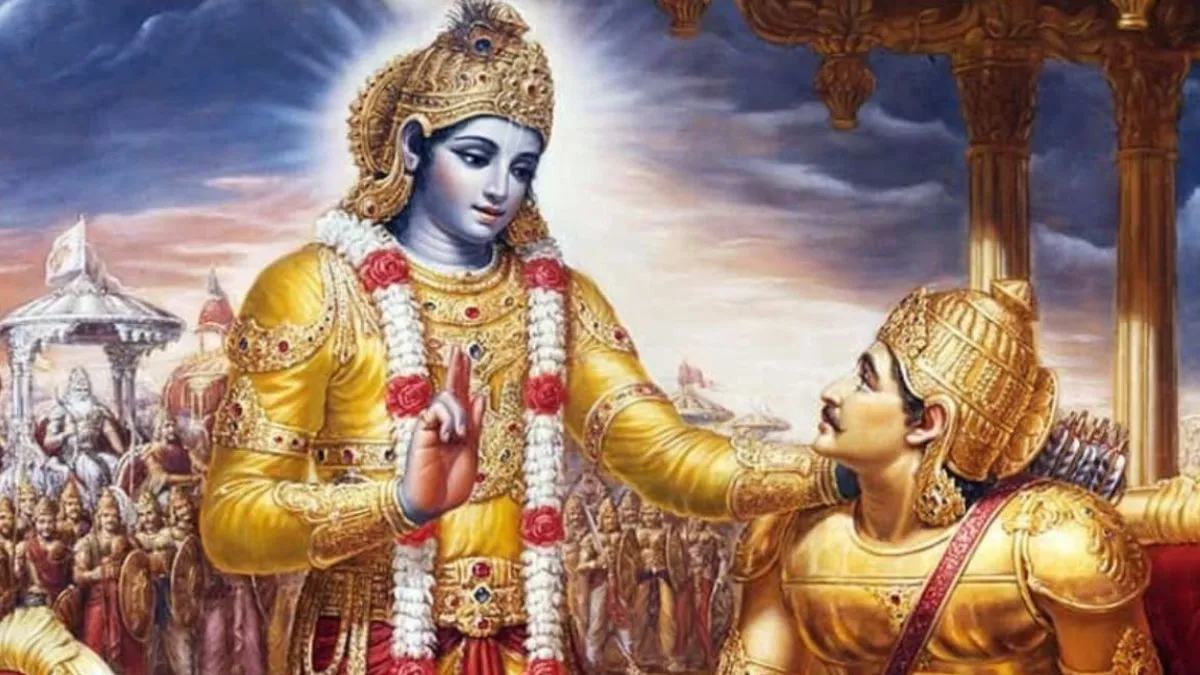- By Kashish Rai
- Wed, 10 Jul 2024 12:27 PM (IST)
- Source:JND
Within the expansive fabric of human existence, the topics of love, marriage, and sexuality might appear to be intricate and captivating. These facets of our lives combine to provide a wide range of relationships, emotions, and desires that make up who we are. However, this may frequently be a difficult process.
We frequently go to our ancient texts for the timeless teachings they provide in our quest for enlightenment. The Bhagavad Gita stands out among the countless sources of spiritual wisdom because it illuminates the path to a deep comprehension of the value of sex, the meaning of love, and the sacred bond of marriage.
The Gita explains the complexities of marriage through a deep discourse between Lord Krishna and Arjuna, revealing that marriage is a spiritual connection of two souls rather than merely a social contract or a means of achieving personal happiness. It helps us see that marriage is about more than just pursuing our own interests; it's about carrying out our obligations to our spouse, our family, and society.
Bhagavad Gita On Love And Marriage
The Gita sheds light on the complexities of marriage by portraying it as a spiritual union of two souls rather than merely a social contract or a means of achieving personal happiness via a profound exchange of conversations between Lord Krishna and Arjuna. It helps us see that marriage is more about carrying out our obligations to our spouse, family, and society than it is about pursuing our own interests.
The Gita text also explores the theme of love, which is the lifeblood that keeps and strengthens a bond between people. Lord Krishna exhorts us to develop an unconditional, selfless love that exists beyond of all attachments and egos. Such love allows a relationship to grow and achieve by fostering a deep feeling of understanding, compassion, and togetherness.

Lord Krishna impacts transcendental Vedic wisdom to Arjuna in the Shrimad Bhagavad Gita on various complexities of life. (Image Source: Canva)
Bhagavad Gita On Sex And Intimacy
The Bhagavad Gita provides priceless guidance on how to navigate the intricate dance of sexual connection. It teaches us to accept the seductive part of ourselves with awareness, seeing that it is not a bodily necessity but rather a strong expression of love, reproduction, and the strengthening of a marriage tie.
While providing guidelines on its appropriate place within the marriage partnership, the Bhagavad Gita acknowledges the importance of sexual intimacy in relationships. In his conversation with Arjuna, Lord Krishna emphasises the significance of engaging in sexual activity within the parameters of "dharma" (righteousness). It exhorts us to see having sex as a way to express our love, have children, and fortify our marriages.
Bhagavad Gita On Overcoming Lust
श्रीभगवानुवाच |
काम एष क्रोध एष रजोगुणसमुद्भव: ||
महाशनो महापाप्मा विद्ध्येनमिह वैरिणम् || 37||
śhrī bhagavān uvācha
kāma eṣha krodha eṣha rajo-guṇa-samudbhavaḥ
mahāśhano mahā-pāpmā viddhyenam iha vairiṇam
The Vedas refer to any wants for material satisfaction based on the body's notion of self as lust, or kām, in addition to sexual impulses. Therefore, lust may manifest itself in a variety of ways, including the need for money, sensual desires, a want for status, a desire for power, etc. All living things are inherently love for God, and our lust is just a twisted mirror of that love.
ALSO READ: Satsang Importance: Know How This Spiritual Gathering Benefits Your Mind And Soul
According to Lord Krishna, sin stems from this "lust" for worldly pleasure, which is the evil attraction that is inside of us. The passion mode tricks the soul into thinking that material possessions would satisfy it, leading to the creation of cravings to get them. Grit arises when want is not satiated, and desire gives birth to greed when it is. When desire, greed, and rage are all present, one commits sins. Anger is the result of thwarted want, whereas greed is only more desire. Lord Krishna so declares that desire, or lust, is the source of all evil.

